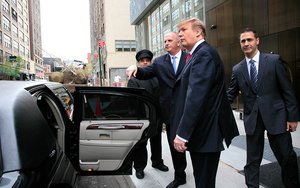
Strange analogy, I know. But I’ve heard stranger ones yet over the past several days. Hear me out on this one. My thesis is that Trump is to politics what other “New
Establishment” brands are to other marketing categories. Yep -- politics can be viewed as just another consumer marketing category, albeit a high-stakes and high-consequence one.
So replace the word “consumer” with “voter” and replace the word “brand” with “candidate,” and I’ll make my case for why Trump is the
Uber, or Airbnb, or Dollar Shave Club or pick the new-establishment-brand-of-your-choice.
What they all have in common is that they understand some key insights that established
brands still haven’t figured out -- or at least, have not figured out how to leverage or defend themselves against.
advertisement
advertisement
Chief among them is a core insight that the world of
consumer marketing has grown so diffuse and amorphous that unless you’re using it to reinforce category or behavioral norms, it just doesn’t work very well anymore. There are just too many
moving pieces influencing consumers, and they’re moving at hyperactive rates that can no longer even be described as “real-time.” (A better term might be “surreal
time.”)
Some might argue that we are living in “Surreal Times,” but I don’t think it’s that complicated. You just have to let go and abandon everything
you know about the art -- and most importantly -- the tools of “persuasion.”
Instead of the “five” of “seven” or however many “Ps” of
marketing, you’ve got to think about one thing -- the consumer’s “unmet need,” how to meet it, and how to get that message to them.
That is the thing all the
New Establishment brands have in common. They have identified an unmet market need. They figured out a way to meet it. And they figured out how to get the message to the market that needs them.
In many -- maybe most -- of those cases, it is not with conventional forms of media or marketing. In fact, it might be quite the opposite -- that conventional forms of media or marketing
might actually turn consumers off from embracing a New Establishment brand.
That’s why it was interesting to me to cover Starcom’s creation of a unit focused on a)
servicing New Establishment brands like Airbnb, Twitter, etc., and b) figuring out how to help the agency’s Establishment brand by doing so. It’s why we picked Starcom as our agency of the
year last year, and while they may not have figured out the secret sauce completely, I think they were on to something. So is Donald Trump.
The brilliance of his campaign strategy
was that he understood that the best way to message an unmet need is in a way that is different than the brands that have been failing to meet the need in the first place. He kept saying that in his
messaging, and in retrospect, he executed it that way in his campaigning too. It’s why he was successful despite Hillary Clinton’s massive media and ground teams, because -- again in
retrospect -- the more she messaged that way, the more it reinforced that she was the old, not the new establishment.
That’s a very difficult thing for establishment brands to
defend against, regardless of the category you are marketing in.